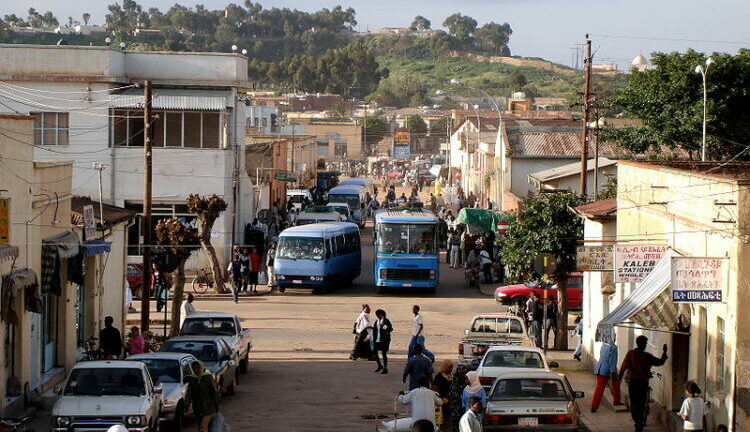By Daniel Tesfa and Mirjam van Reisen
22 August 2025 (IDN) — A new wave of arrests in Quatit has heightened unease in Eritrea’s southern region, with locals reporting that dozens of residents have been detained in recent weeks.
Among those arrested is the father of Shishay Tesfalem, the owner of the YouTube-based media outlet Neshnesh TV, whose outspoken presence online has drawn both attention and criticism.

Residents from Quatit say the detentions began suddenly and targeted a wide range of people, including traders, youth, and relatives of those with a media or political profile abroad.
“It is difficult to know the exact number or the full reasons, but most of the detainees are from Quatit,” said one source with knowledge of the situation. Some of those taken were later released, while others, including Shishay’s father, were transferred to Ala military prison, a facility long associated with political detentions.
Owner and host of Neshnesh TV, Shishay, said “the PFDJ agents abroad fabricated a story that my father is human trafficker while my father is a bus driver in Quatit.” He adds “this is the common mechanism that the PFDJ uses to silence public voices in the diaspora.”[1]
Quatit is a town with deep historical significance in the Debub (Southern) region. Known as one of the oldest continuously inhabited settlements in the area, it has long served as a hub for farming communities and local trade routes connecting Asmara, Dekemhare, and Adi Keyih.
Historically, the Battle of Quatit in January 1895 was fought between Ethiopian forces under Ras Mengesha Yohannes and the Italian colonial army as part of Italy’s attempt to expand its control in Eritrea. The clash ended in a significant Italian victory, weakening Ethiopian resistance in the region and paving the way for further colonial advances until the decisive Battle of Adwa a year later.
The town has also carried cultural importance, with its traditions of agriculture, communal wells, and market gatherings forming part of Eritrea’s rural identity. Yet, in recent decades, Quatit has suffered from neglect, economic decline, and the heavy presence of state security.
The recent arrests on civilians dwelling in Quatit come amid mounting restrictions on mobility and worsening transportation problems in the region. Locals recall that until recently, there was one state-owned bus service connecting Dekemhare and Quatit daily.
That route has since been suspended, forcing residents to rely on private cars at prohibitively high costs. “For years now, people have had no reliable way to travel between towns,” a source explained. “You either rent a private car or you don’t travel at all. And when people do manage to travel, they face checkpoints, interrogations, and the risk of being arrested.”
In Quatit’s case, the suspension of bus services was never restored since the COVID-19 pandemic, leaving a small agrarian town cut off from much of the country. Sources say this has contributed to economic decline and greater scrutiny from security forces. “Oh, after COVID-19, no more buses,” a source said. “It’s been very hard.”
A source from Quatit stated: “In the Quatit area, young people have been resisting the indefinite national service. Particular after 2021 [during the war in Tigray, in which many Eritrean soldiers were deployed], youth has rejected the national service and tries to escape to Ethiopia. The parents of those that flee, are forced to pay 50,000 nakfa as a punishment. The people in Quatit rejected these measures and responded with disobedience. As a response and punishment the Eritrean regime is putting blame on the population, making accusations that the children are opposing the regime.” As a result, tensions have increased.
By punishing relatives inside the country, authorities aim to pressure exiles into silence or compliance. The transfer of detainees to military facilities such as Ala prison underscores the seriousness of the crackdown. The UN Commission of Inquiry on Human Rights in Eritrea labelled such actions by the regime: punishment by association. This is when for example parents are punished for their child fleeing the country or parents are being punished for children openly criticizing the Eritrean regime. The purpose seems to stifle any opposition and to push people to stay silent.
The arrest of Tesfalem’s father has drawn particular attention because of his son’s media presence abroad. Shishay Tesfalem, through Neshnesh TV, has been active on YouTube, sharing commentary that often touches on Eritrean politics and society. While he has gained a following, he has also been the subject of sustained criticism from rival YouTube platforms such as Solomedia. Supporters of Shishay, however, argue that his father’s detention is a clear act of reprisal for his online activities.
Observers note that this pattern fits a broader strategy by the Eritrean regime, which has a long record of targeting the families of critics and dissidents living abroad.
As the situation develops, questions remain about how many remain in custody, whether more will be arrested, and what message the regime intends to send. For now, Quatit’s people face both isolation and intimidation, with little clarity about what lies ahead.

